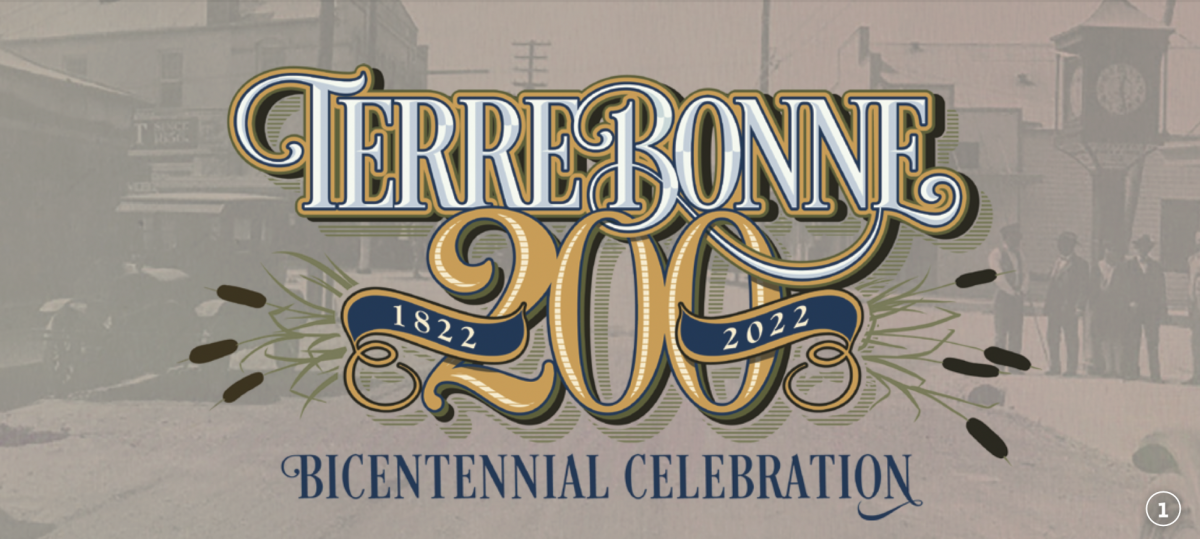
Duck Camp Dinner Recipe: Duck a L’Orange
October 1, 2022
Early Detection, Advanced Treatment Still Best Defenses Against Breast Cancer
October 1, 2022Close your eyes for a moment and think back to your oldest memory… Can you remember back 10 or 20 years? How about 40 or 50? Are you lucky enough to remember a childhood memory from more than 80 years ago? Imagine with me what it would be like to remember what life was like 200 years ago when our parish was first founded. Small markers and tributes exist across the parish in the form of street and building names, honoring those who founded the “good earth” setting into motion the future of our parish.
On April 6, 1822, at the home of citizen Alexandre Dupre, a meeting was held to form a Police Jury for Terrebonne Parish (currently the Terrebonne Parish Consolidated Government) based on a petition of 12 inhabitants and an order of election from Parish Judge Francis M. Guyol. The first four resolutions were on the organizing of the Terrebonne Parish Police Jury, appointment of a Clerk, and forming rules and regulations for the new Parish.
Twelve years later, Houma became the seat of Terrebonne Parish, founded in 1834 on land donated by Hubert M. Belanger and Richard H. Grinage in order to establish a centrally located and more easily accessible parish seat. Prior to this, the county seat had been set at Williamsburg (now Bayou Cane) approximately four miles northwest of present-day downtown Houma. While Williamsburg sat at the junction of two bayous, Bayou Cane and Bayou Terrebonne, government officials felt that Houma, which sat at the convergence of six bayous, would provide better access for commerce and development in Terrebonne Parish. Houma was incorporated on March 16, 1848.
As the years passed, the town began to grow. Local leaders helped to build five stores, 10- 12 dwelling houses, a church, a blacksmith shop, a school-house, hotel, a grogshop (tavern), and a billiard-room. A parish justice system was also constructed, including a building to house the courthouse, clerk’s, sheriff’s and recorder’s offices. A jail was also built.
Covering over 2100 square miles, Terrebonne Parish is now the second largest parish in the state, and in its 200 years of existence, generations have helped shape its culture, building a beautifully close knit community.
The planning of the year-long celebration began nearly three years ago, with Parish President Gordon E. Dove and committees teaming up to plan presentations with local businesses and citizens, highlighting the history, culture and heritage of our beloved parish. The Bicentennial Celebration kicked off in April with “Good Earth, Good Business” as its first presentation of the year. Throughout the year, dedicated committees hosted a plethora of fun-filled and educational events, including Cultivating Good Earth, Good Earth Gumbo, and Laissez Les Bon Temps Rouler Terrebonne.
Christopher Pulaski, Chairman of the Terrebonne 200 planning committee, said the planning began in late 2020, but came to halt following Hurricane Ida. “Our planning committee began meeting in 2020 to discuss what we wanted to do, and in the Spring of 2021 we really started meeting on a regular basis. The original plan was to assign each committee one of 12 different topics, ranging from transportation, architecture, seafood, government, sports, entertainment, and other aspects of life in Terrebonne Parish. The idea was to have a set theme for each month of the year. But because of Ida, we weren’t able to meet as planned and we were forced to condense our plans. We also planned to have a festival in April 2022, but because of the storm, we felt we had to push it back.”
Chris said during the planning phase, the committee wanted to ensure the community was heavily involved in the celebration; he discussed the importance of including small businesses and local organizations in the year-long festivities. On Saturday, October 15, the parish will host a Festival and Parade.
Chris, with the help of the committee, reached out to local businesses and food vendors to provide a platform for exposure. “One of the biggest aspects of our recovery process is economic development. We want to promote local businesses in any way possible. We have local acts in music and entertainment, and local food vendors, which will help get their name out there. The local Rotary are doing beverages and water, and Terrebonne High Athletic Group will have shrimp and fry baskets for sale,” said Chris.
The Festival and Parade will kick off at 11 a.m., featuring presentations on large monitors, art displays, and the return of a historic piece of Houma’s history. “We’re gonna have an opening ceremony and a ribbon cutting for the new bandstand at the Courthouse Square. The effort to raise the money to construct the bandstand was led by one of our local non-profits, the Hache Grant Association. At the turn of the century, there was a bandstand in roughly that same location at the square. The new bandstand isn’t intended to be a replica, but intended to represent it. We’ll be able to do a ribbon cutting and we’ll have live music by community bands there and larger acts at the main stage.”
The parade will begin at Town Hall and will be open to anyone who wants to participate. Organizers ask participants to wear costumes of something from the last 200 years. Another fun event will be the burying of a time capsule.
“We’re going to put [the Bicentennial] time capsule next to the 150th year time capsule so in 2122 they get to open them both,” shared Chris. The capsule will include remembrances of this year, including a copy of the local newspaper, a covid test kit, and balloons and cups from the Bicentennial celebration.
As the past often guides our future, much of the inspiration for the Bicentennial Celebration came from a brochure from the 1972 celebration to get an idea of the direction to go in. “Those organizers put together a brochure that highlighted the whole event and what they did, so we used that as a guide to get it started,” shared Chris. “The planning committee came up with the idea of breaking everything up into 12 different topics. We contacted the different businesses and organizations that are experienced in the topics. Each committee created a presentation that lasted for about 1 1⁄2 hours, collecting memorabilia, and anything that might be useful to their presentation.”
Chris said although Hurricane Ida devastated Southeast Louisiana, he believes the catastrophic storm helped make the community stronger in unity, giving residents of Terrebonne all of the reason to celebrate. “Ida obviously wasn’t a part of our thinking process when we first started discussing the celebration, but now I think now I think it’s a great rallying point that our community can get behind and say here we are and look how far we’ve come. We’re celebrating 200 years of Terrebonne’s history and we’re certainly looking at the future for another 200 years. Whether it’s a storm or a pandemic, we’ve got the same power and community pride, and we’re going to continue with the same strength into the next century. Hurricane Ida was a terrible thing but it’s also providing us with this new opportunity that we’ve never seen before. This is a pivotal point but it’s also a starting point. It’s the beginning of our future today, and I think that’s gonna be one of the biggest messages we put out during this celebration.”
The remaining presentations for Bicentennial Celebration will cover Architecture, Sports, Seafood, and Entertainment. Chris said the presentations are educational and a great way for citizens of all ages to learn more about the parish and your community. “Let’s enjoy each other and our community while learning about the past 200 years, and have some fun.You will learn something at every event and it’s important to know the history of your community. It’s good to build a sense of pride about your community and it gives you an idea of where we’re going in the future. Was it an easy 200 years? No, but we have to learn from the mistakes made in the past to create a better future. Knowing the history of your community gives us a good general direction on where we should be headed.”
Proceeds from the Bicentennial Celebration will be donated to the Helio Foundation to help victims of Hurricane Ida and to beautify Terrebonne Parish.

















